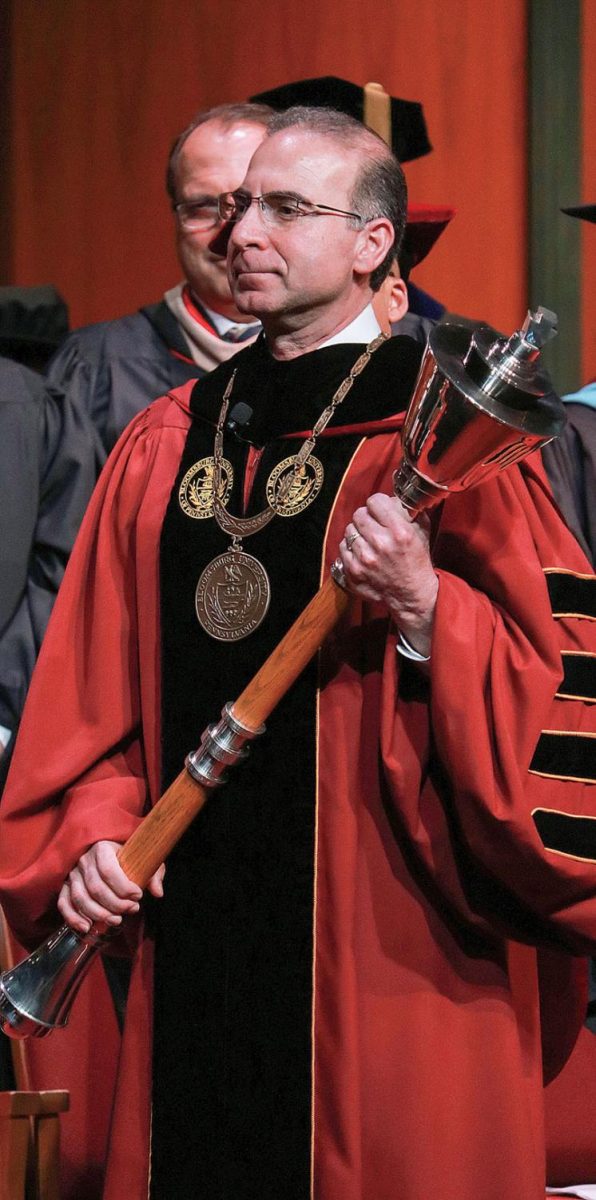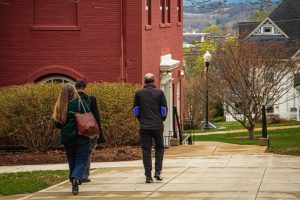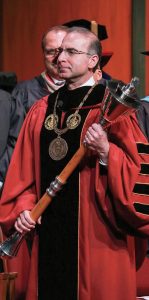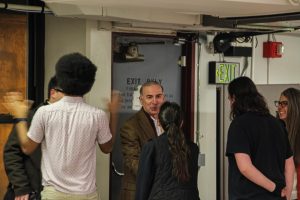Northeast Integration Livestream Recap
November 30, 2021
Student media organizations from Bloomsburg and Mansfield teamed up to create a livestream conversation regarding the integration of Bloomsburg University, Mansfield University, and Lock Haven University.
The livestream was made up of panelists who all have a hand in what is to come with the new integration.
These panelists included campus administrators, state representatives, faculty and staff leadership, and athletic departments and student life.
Many questions were answered about the future of these three universities.
Campus Administrators
The panelist for the Campus Administrators section included Dr. Jamie Martin, APSCUF President, Dr. Diana Rogers-Adkinson, Provost of Bloomsburg, Dr. Ron Darbeau, Provost of Lock Haven, and Dr. John Ulrich, Provost of Mansfield.
The moderators included students journalists Aaron Sudia Boivin with BUNow, and Sarah Hart with The Flashlight.
Bloomsburg, Mansfield, and Lock Haven will all be able to keep their own identities moving forward. Dr. Diana Rogers-Adkinson said that all schools will keep their names forward. An example of this could be, “Bloomsburg Northeast,” or the respected name that gets chosen for the title of the integrated university.
All schools will keep their mascots, and Adkinson said they are working closely with the NCAA regarding keeping all colors of team sports the same to the respected university.
One of the biggest questions of the livestream regarded the recent decision to pull majors from the new program array.
ASPCUF President Jamie Martin said, “We were disappointed to see program array and the way in which it’s limiting opportunities or lamenting the number of programs that will be available to students.”
Adkinson then went on to say, “I’d like to talk about the perception that we have eliminated programs in the northeast. There are six programs we did not include in the array. I met individually with each of those departments and let them know those were areas in which we needed additional data and information to be able to understand their role in the array.”
The lack of transparency with this program array has many faculty feeling like they’re being pushed out the door.
Adkinson went on the answer this. When Adkinson called the department chairs, they were told that their programs were not being put into moratorium and that this was a new decision that they were exploring.
There is still an opportunity for these programs to continue in the array if they can find a way to make sure that enrollment trends can be changed.
BU severed their relationship with the Greek life system while Lock Haven and Mansfield both have Greek Life. The answer was simple. Each university will carry on their respected policies with Greek Life.
“The status will maintain currently as it is for each of the three campuses. BU at this time continues to not want to reengage yet with Greek Life given some of the concerns that have come forward over the past few years,” Adkinson said.
Mansfield and Lock Haven will continue with Greek Life, and BU’s Greek Life will stay as it is.
Throughout all three universities, Adkinson said it’s important to ensure that all students have the same opportunities.
The student then has the opportunity to pick between a small, medium, or larger campus catered more toward what they prefer, but all with the same opportunities.
All prices of tuition will stay the same at BU in the coming Fall semester. Future changes to tuition changes are still to be addressed.
The question on many students’ minds is, “Why is this integration happening?”
Reducing costs was the popular answer among the provosts.
Dr. Ron Barbeau, Provost of Lock Haven said, “It will provide students access to a lot more programs, faculty, and services. The two largest drivers for this integration are more opportunities for students and reducing costs of attendance.”
State Representatives
The panelists for the State Representative Section included State Representative Stephanie Borowicz, 76thDistrict, and State Representative David Millard, 109th District.
The student moderators included Melanie Aikins, Montana Farner, and Madelyn Mertz with The Voice, Aaron Sudia Boivin and Ava Stasen with BUNow, and Sarah Hart with The Flashlight.
The one question that continually lingers is, what is the main reason behind this integration?
Representative Stephanie Borowizc said that enrollment going down was the number one concern. There was also concern of losing higher education in the state system.
When asked about the desired outcome of this integration, as well as drawbacks of it, Representative Millard said, “I think the goal at the end of it is to keep the presence of the university systems. Affordable and accessible is what we want. With enrollment dropping, sometime there is painful decisions that have to be made.”
The drawbacks are the retrenchments. Early retirement is an option she mentioned, then there are no retrenchments with people that want to stay, Representative Borowicz added.
Ava Stasen posed the question, “What would happen if enrollment would continue to decline in these state schools? What is the next step going forward to keep higher education affordable and accessible in Pennsylvania?”
“I think we have a prime example with Penn State and their satellite campuses. The strongest university, the flagship university, and I don’t mean that demeaning to the others, but obviously Bloom was chosen as the flagship. That would mean the others would be utilized similar to what Penn State does with satellite facilities,” Representative Millard said.
The Representatives both said that they cannot speculate that enrollment will go down.
“Hopefully this (the integration) is used to save the higher education system. It keeps costs down, and it’s for students to be able to afford it,” Representative Borowicz said.
State funding was the next topic to be brought up.
“$25 million was put towards this integration program. I don’t think it necessarily a cost issue. We are fully funding our state systems and then this integration program,” Representative Borowicz said.
When asked about student loans and debts, Representative Borowizc said that that is a personal responsibility.
Faculty and Staff Leadership
The panelist in this section included APSCUF Campus Presidents Dr. Richard Goulet, Lock Haven, Dr. Eric Hawrelak, Bloomsburg, and Dr. Brian Loher, Mansfield. It also included AFSCME Campus Presidents Shawn Makar, Bloomsburg, and Mike Wilson, Mansfield.
The student moderators included Melanie Aikins, Aaron Sudia Boivin, Sarah Hart, and Eliza Nevis.
The first question asked by BUNow’s Aaron Sudia Boivin was, “What was your hand in this process?”
“In terms of the early part of this process, the faculty at LHU were largely against this entire process of consolidation,” APSCUF Campus President Dr. Richard Goulet of LHU said.
He went on to say that the APSCUF union and the majority of faculty expressed an opposition to consolidation. The integration was said to be the only option for financial sustainability.
APSCUF President Dr. Brian Loher of Mansfield said that after the board of governors voted to accept the proposal in April, there was a public comment period. There were hundreds of public comments, and 95% of which were opposed to consolidation.
This integration was going to happen from day one, whether people agreed with it or not.
“We are all trying our best to work with it as it is now and try to make it better for all you folks as we go forward,” Loher said to the student moderators.
Mel Aikins posed the question, “How will faculty and staff devote the same attention that we are currently getting as singular universities, to three universities?”
Dr. Eric Hawrelak, APSCUF President at BU responded, “I think it’s going to be a lot more difficult. We at Bloomsburg are used to a certain number of student and sizes of classes. As you bring in two additional campuses, and bring in all those students, that’s a lot more students we will have to deal with on a daily basis.”
Students will see their class sizes grow making it harder to have a better relationship with professors.
Hawrelak went on to say that most faculty chose the universities they are at because they appreciated the student to faculty ratio that they started with. With this, classes may experience more hybrid types of courses as some students may have to zoom in from the other campuses.
When asked about the cut of some faculty and staff, AFSCME President Shawn Makar of BU said, “There’s a lot of things that we could do that would be helpful to keep costs down. But unfortunately, when we talk about transparency and we are included in conversations, the conversations we are included in are after the decision are made by the management. Then we are told what’s going to happen, and it’s sad.”
Makar went on to show his appreciation for faculty and staff while AFSCME President Mike Wilson of Mansfield showed his gratitude for all the work secretaries have to do.
The cuts in the program array were also asked to the panelist.
Hawrelak expressed that the legislators, board of government, and chancellor’s office have all let the PASSHE system become a business. They’re seeing a loss in profit, so they cut service. When services get cuts, customers, who are students in this case, become upset and start to leave, so enrollment goes down.
“Education should be an investment, it shouldn’t be run like a business,” Hawrelak said.
AFSCME President Mike Wilson of Mansfield said, “People are getting overworked. The funding needs to be there and it’s not there. That’s what PASSHE was built on: Cheaper education for students. It’s gotten way too high that the funding needs to be there to support the backbone of the university.”
Campus Athletics and Student Life
The panelist on the last section of the livestream included Dr. Michael McFarland, Director of Athletics at BU, Peggy Carl, Director of Athletics ad Mansfield, Dr. Tom Gioglio, Director of Athletics at LHU, Albert Jones, Chief DEI Officer at all three universities, and Austin Boroch, Pride Center Coordinator at Mansfield.
The student moderators included Aaron Sudia Boivin, Josh Evans, Sarah Hart, and Madelyn Mertz.
Each athletic department will be keeping their current array of sport offerings. They will also keep their current NCAA membership and their conference affiliation. Each university will keep their identity with their own colors and mascots.
Recruitment will stay the same. For example, Lock Haven recruits against Bloomsburg and Mansfield, and that will continue to stay the same.
The concern amongst parents can be that this integration is the big unknow, Peggy Carl, Director of Athletics at Mansfield said.
The traditions will continue for each respected university athletic department. Bloomsburg students will still be rooting in the stands at a football game against Lock Haven, even as an integrated university.
Albert Jones, Chief DEI Officer at all three universities said with this integration, students will be exposed to different setting that will expand interpersonal relationships. Students can expand their social network and diversify their education experience as all three universities integrate.
Residence Life throughout the three universities plan bring some sessions together to try and create a sense of extended community, Austin Boroch, Pride Center Coordinator at MU said.
“It’s all about student success. That’s what we are going to be doing, making sure they succeed in all their endeavors across all three campuses,” Dr. Tom Giogli, Director of Athletics at LHU, said to end the livestream.
You can watch the full livestream on BUNow’s Facebook.




















